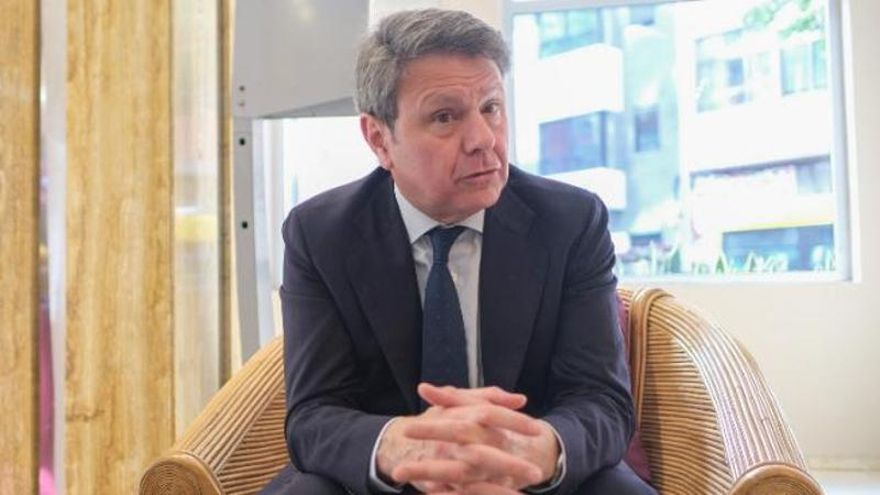
With Canarian ports and airports reaching a historical peak, it is essential to advance their sustainability. José Antonio Santano, who was the Mayor of Irún, understands the significance of the migrant influx affecting the islands.
Do the Canarian ports redirect traffic due to insecurity in the Indian Ocean?
Indeed, but it is not just due to their strategic positioning. The ports in the archipelago, in terms of both infrastructure and management, have proven their capabilities and are seizing opportunities. Last year, the cargo throughput in the port of La Luz increased by 14%, while Santa Cruz de Tenerife saw an approximate rise of 10%. This indicates double-digit growth.
Can this moment be leveraged to establish a presence in other vital markets?
That is already happening. The supply of fuel is largely driven by large-draft vessels. In the medium term, the Canary Islands could become a key reference point for developing more sustainable fuels.
Are further investments necessary in this context?
Any port investment is typically planned for the medium term, although there is always room for additional responsive elements. For Canarian ports that rely on state funding, around 630 million euros are allocated. The most imminent project is the extension of the breakwater at Puerto del Rosario by 250 metres, which will cost between 42 and 43 million euros. Other priorities include completing the port of Granadilla and configuring the Africa dock in the port of La Luz. We are prioritising non-capital ports as they are closer to urban areas, and we believe their electrification will occur more swiftly.
“We have time, and we are preparing the Canary Islands to maintain strength when trade rights enter the spotlight.”
Is it feasible to advance the decarbonisation deadline for ultra-peripheral regions such as the Canary Islands?
Absolutely, the islands are already exempt from emission trading rights until 2030.
Does that imply that, after that year, momentum will be lost?
We believe and hope not. Primarily, because we have time, and we are making preparations. The investments I mentioned previously are part of that strategy. Furthermore, we anticipate that innovation will progress, even with public funding, to decarbonise the maritime sector. Rather than seeing this as a risk, I view it as an opportunity for the Canary Islands. Spain is leading these efforts within the European Union, and our minister [Óscar Puente] has been dedicated to this goal from the very beginning. We are collaborating on an initiative within the EU to monitor the impact of trading emissions rights in real-time. We must advance sustainability without compromising our competitiveness.
Is personal rescue a priority when it comes to addressing migration? Is social stability ensured amidst protests?
The commitment of Sasemar (the maritime rescue and safety service) since 2018 is evidenced by data, with personnel numbers having increased by approximately 20%. Back then, we only had one vessel known as Guardamares; now there are five, four of which are stationed in the Canary Islands. We have added a further quarter of a crew to the Salvamares, whereas just one existed seven years ago. All their efforts deserve recognition, as what they do is not only vital but also extremely challenging. There is room for dialogue to address any concerns they may have.
With your extensive experience as the former mayor of Irún, do you see a resolution for the migrant situation?
It disheartens me that the stance of the Popular Party (PP) is hindering [Pedro] Sánchez from reaching a significant agreement. Nonetheless, I remain hopeful that this can be achieved at some point; it is a matter that demands the attention of all political factions since we are discussing a humanitarian crisis. It is crucial to talk in terms of solidarity among autonomous communities. I fully empathise with the Canary Islands’ situation, as I have witnessed it firsthand. We had a reception centre, and migrants faced numerous challenges while attempting to cross the border into France, resulting in significant inflows of hundreds of young individuals eager to continue their journey but unable to proceed.
“It saddens me that the PP’s stance obstructs reaching a substantial agreement on migration.”
Let’s shift our discussion to airports. We’re on the verge of new investments. Are we facing issues of user congestion and aircraft saturation?
There has been a rise in passenger numbers across Spain. Canarian airports are experiencing about a 17% increase compared to pre-pandemic levels. We have an ongoing investment plan exceeding 600 million euros, and the new proposal surpasses 1,000 million euros, predominantly affecting Tenerife Norte, Tenerife Sur, and Lanzarote, as Gran Canaria has seen considerable investment in recent years.
The lack of a railway network limits Canarias’ access to funding for train enhancements. Is there a viable solution?
We have proposed two protocols to the regional government and the Cabildos of Gran Canaria and Tenerife; these are distinct due to the varying stages of project development, with the Gran Canarian plan being significantly more advanced. Rail transport is critical for decarbonisation and sustainable mobility in both Spain and Europe. What we are advocating for is an evaluation of the economic viability of these studies. We aim to be included in the projects, and it is only logical to establish a collaborative framework that encompasses financing, involving the Government of Spain, the Canary Islands government, the Cabildos, and the European Union. Contributions must come from all these levels.
















